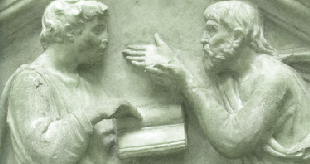Teaching high school students, I have occasionally been asked whether I believe in God, and I’ve developed an answer that gets me off the hook. I explain that there are plenty of ideas of God I can’t accept (and in relation to which I would unabashedly call myself an atheist), but there are other ideas of God that give me pause, ideas for which I keep an open mind if not necessarily full-fledged belief. That’s usually enough to satisfy the questioner, especially when I can provoke further conversation by turning the question back and asking, “And just what idea of God did you have in mind?”
I learned that approach to the question from a book I read about 50 years ago, when I was a sophomore in high school. It was Honest to God by John A. T. Robinson, an Anglican priest. Its point was that most people seem to carry around ideas about God and Christian belief that they learned in Sunday School, but that adults need to move on to more mature thinking about theological matters. I can’t remember many details of the book, but it was very stimulating, and it put me on to reading popular writings by important religious thinkers of the day, including Tillich, Bultmann, Buber, Bonhoeffer, and others.
I’ve just completed another book that encourages more mature reflection on what it means to “believe in God” and what the word “God” may refer to. The book is Saving God: Religion after Idolatry by Mark Johnston, professor of philosophy at Princeton. It’s a much more intellectually demanding book than the one I read in high school, but it’s equally stimulating: it reminds the reader of how some profound thinkers of the past wrestled with the fundamental questions, and along the way it challenges much current thinking about God, both among believers and among atheists.
Johnston begins the book quite provocatively, asserting that a conception of God purged of idolatry is so rare these days that “it remains a live possibility that no object of conventional worship is, as yet, God. That is why belief in God may be a much rarer thing than has been almost universally supposed.” Elsewhere he explains the title of his book this way: “Saving God is saving God from us, from our lazy and self-satisfied conviction that our conventional patterns of belief and worship could themselves capture God.”
This is not an easy book, nor is it narrowly conceived. The reader will encounter Thomas Aquinas and Maimonides, Kant and Spinoza, Wittgenstein and Heidegger, René Girard and Pope Benedict XVI. There are novel interpretations of Eve’s attraction to the tree of knowledge of Good and Evil and of the book of Job, along with an interesting and controversial approach to reading Mark’s gospel. We are invited to understand the distinction between “scientism” and “legitimate naturalism,” to ponder the challenge of the idea of “presence” to the reigning “representationalist” view in epistemology, and to explore how “panentheism” can be compatible with a world view that rejects “supernaturalist” causation. A very interesting section of the book develops an idea of “salvation” that is decoupled from belief in an “afterlife” (which, by the way, he characterizes as idolatrous).
In the end, the reader is left with many more questions than answers. Partly, that’s because the author is aiming not to give answers so much as to provide a coherent framework for asking useful questions. Partly, he is not really trying to persuade so much as to bear witness to his own attempt to reconcile his religious impulses with his appreciation of the hard-won perspective of modern science. In the preface he describes the book as “simply an expression of a certain sensibility.” Later he admits that his answer to the question, “Do you believe in God?” is always, “I can only hope I do,” and calls his book “an exploration of how things look when that hope seeks understanding.”
Despite reservations here and there and many questions, I think this an excellent book. I suppose in part that’s because it explores a number of topics that I too have thought about (but less articulately) off and on over the past five decades. I felt such a kinship with the author in respect to the issues he was bringing into the light that, when I finished reading the book the first time through, I was almost giddy with gratitude.
In working my way through the book a second time, I produced a chapter-by-chapter, section-by-section synopsis of Johnston’s main points, along with quotes from the book that are especially useful in understanding his perspective. Please take a look at it if you want to follow up on some of these ideas. (Better yet, read the book itself!)
I expect to return to a number of the issues raised in this book in subsequent entries.

Comments are closed.